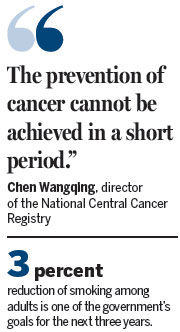
Rising cancer rate drives prevention plan
Source:China Daily
He Na
Updated: 2015-09-14
Commission seeks more registration, better education, smoking reduction
Health officials seeking to curb the country's fast increasing cancer rate are implementing a three-year nationwide plan that expands cancer screening, registration and prevention while reducing smoking.
Cancer has become a major public health problem, with some 2 million people dying of cancer every year and more than 3 million new cases reported annually, the National Health and Family Planning Commission said.
"The prevention of cancer cannot be achieved in a short period," said Chen Wanqing, director of the National Central Cancer Registry, which the commission established to track cases in 2002.
"We are working on a medium-and long-term plan now, and that plan will provide profound guidance," he added.
China's aging population, environmental pollution and unhealthy lifestyles have helped drive up the country's cancer incidence rate and death rate in recent years.
The plan seeks to better protect people's health by improving cancer prevention, standardizing the country's cancer registration system and expanding cancer screening and early detection to increase five-year survival rates.
Specific goals of the three-year prevention plan include increasing cancer patient registration to 30 percent of the country's population, increasing the percentage of the population that has essential knowledge of cancer prevention to 60 percent, and reducing the smoking rate among adults by 3 percent.
The plan was released last week by the health commission, the National Development and Reform Commission and 15 other governmental departments.

To ensure implementation, the plan also clarified the individual departments' responsibilities. The education department, for example, is responsible for health education on cancer prevention for primary and secondary school students.
The environmental protection department is expected to deal with major environmental pollution threats.
The plan also encourages the creation of new anti-tumor medications to help reduce the economic burden for cancer patients, and an expansion of basic medical insurance coverage for major diseases such as cancer.
The plan's goals are both practical and achievable, Chen said.
China's current registration coverage has reached 25 to 26 percent, so an increase to 30 percent is doable, Chen said.
"But still it has a long way to go, as some countries have achieved 100 percent registration. The higher the rate is, the more data and information we gain for research," he said.
China's current cancer spectrum not only has the character of developing countries, but also that of developed countries, Chen said.
Liver, gastric, esophageal and cervical cancer are the most common cancers among people in the developing world, while lung, breast, and colorectal cancer are more likely to affect residents of developed countries.
"Before, we could focus on the prevention and treatment of cancers that those in developing countries mainly suffered, but now we have to put our energy and investment into the treatment of more kinds of cancers," he said.
Wang Xiaodong contributed to the story.
hena@chinadaily.com.cn
(China Daily 09/14/2015 page3)

World Family Summit
The World Family Organization was founded in Europe in 1947 and headquartered in Paris.
Link: / World Health Organization / United Nations Population Fund / UNICEF in China
Copyright 2014 National Health and Family Planning Commission of the PRC All rights reserved






